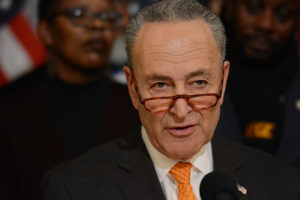The Senate this week will consider the final $858 billion fiscal year 2023 National Defense Authorization Act (NDAA) and is likely to take up a one-week stopgap funding bill to provide more time for finishing full-year appropriations legislation, Majority Leader Chuck Schumer (D-N.Y.) said Monday.
During floor remarks, Schumer noted that negotiations on a final FY ‘23 omnibus spending bill are ongoing and will likely require another continuing resolution (CR) to keep the government open beyond December 16 to complete the work.

“Over the weekend, appropriators held positive and productive conversations, enough that both sides are moving forward in good faith to reach a deal even if it’s not going to be everything that both sides want,” Schumer said. “Later this week, members should be prepared to take quick action on a CR, a one-week CR, so we can give appropriators more time to finish a full funding bill before the holidays. I’m optimistic we can take action on a CR rather quickly and avoid the shutdown that neither side wants.”
Defense Secretary Lloyd Austin late last month urged Congress to pass full spending bills before the end of 2022, telling lawmakers in a letter that operating under a CR reduces the Pentagon’s topline “by at least $3 billion per month” below the requested FY ‘23 funding level (Defense Daily, Nov. 28).
“Under the CR, the progress funded by our FY2023 research and development budget – the largest requested in history – cannot take place. And our FY2023 procurement request – also the largest requested in history – cannot be fully executed. An ongoing CR will cause delays in all three legs of the nuclear triad when we have no schedule margin left to give. It is also slowing our progress in space, delaying necessary new investments in our industrial base and getting ship construction on contract,” Austin wrote in his letter.
Congress previously passed a CR to keep the government open through Dec. 16 as it works to complete final budgets for FY ‘23, while the move sets spending at the previous fiscal year’s funding levels and prohibits the Pentagon from initiating new programs (Defense Daily, Sept. 30).
Air Force Brig. Gen Pat Ryder, the Pentagon press secretary, has said a situation where the department has to operate under a full-year CR would prohibit 192 new programs and 97 military construction projects from starting as well as halting production rate increases for 49 programs.
The House Appropriations Committee previously voted 32 to 26 in June to approve its $761.7 billion FY ‘23 spending bill for the Pentagon (Defense Daily, June 22).
In late July, the Senate Appropriations Committee released its plan to spend $850 million on defense-related programs in FY ‘23, to include $792.1 billion for the Pentagon (Defense Daily, July 28).
Schumer also noted the upper chamber will take up the NDAA this week, adding “I hope we’ll send it to the president’s desk very soon.”
“The NDAA has consistently been a bipartisan effort, and that’s my expectation this year too,” Schumer said.
The House voted 350 to 80 last week to pass the $858 billion FY ‘23 NDAA, which includes a $45 billion topline increase and a provision that would allow the Pentagon to buy select critical munitions using multi-year contracts (Defense Daily, Dec. 8).